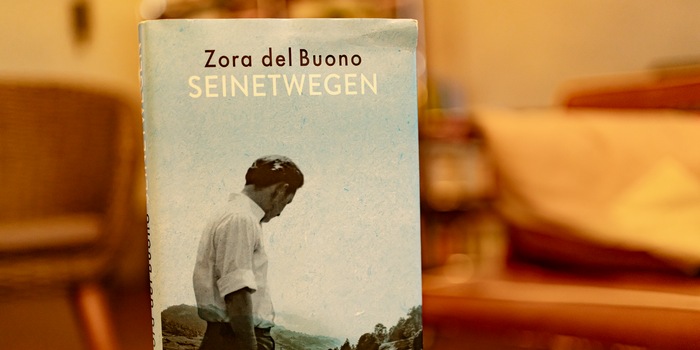

Swiss Book Prize: The surprising lightness of death and grief
In her autobiographical novel "Seinetwegen", Zora del Buono deals with the death of her father and the grief and loneliness in her family. She achieves this with remarkable ease and an unconventional narrative style. She has now been honoured with the Swiss Book Prize for her work.
The favourite has won. The Swiss Book Prize 2024 goes to Zora del Buono for her autobiographical book "Seinetwegen", which was already on the longlist for the German Book Prize. The novel is up against "Favorita" by Michelle Steinbeck, "Tabak und Schokolade" by Martin R. Dean, "Verschiebungen im Gestein" by Mariann Bühler and "Polifon Pervers" by Béla Rothenbühler.
The winner:

The other nominees:
Zora del Buono takes me as a reader on a journey into her own past, into the history of her family and into Switzerland in the 1960s.
In 1963, her father died in a car accident when she was only eight months old. For 60 years, her father and his death were a taboo subject between her and her mother, who never remarried and only had one relatively brief relationship with another man. For Zora del Buono, the taboo only fell, and only indirectly, as her mother's dementia progressed.
An associative journey in short episodes
And so she begins her search for the man who killed her father in his red, poorly maintained Chevrolet during an overtaking manoeuvre on the Linth plain - the killer, she calls the anonymous man, of whom she only knows the initials.
The structure of the 200-page novel follows del Bueno's associative train of thought on her research journey. And journey is to be understood quite literally. I accompany her on journeys along the route of the accident, to the Glarus region, to a classic car meeting, but also to the people who might have known the man - and in some cases did.
Sometimes in a few words, sometimes in page-long episodes, the author jumps from her conversations with these people to her thoughts about the killer; from her relationship with her mother to social reflections on the rural and urban Switzerland of her childhood. I look over her shoulder, so to speak, experiencing the story together with the author, who wrote the story in parallel to her research. So I always know as much as she does, which forces me to follow her steps and train of thought in re-live, so to speak, and to reflect on my own thoughts and feelings about the events.
Empathy and forgiveness in the face of death and grief
As erratic as this associative sequence may seem on the first few pages, the narrative thread remains clear. I neither lose track of the big picture nor my interest in the various strands of thought or digressions, for example about the history of the VW Beetle (the car in which her father was a passenger) or about road accident statistics from Germany, Switzerland and the world.
While del Buono is always on the trail of death, human loneliness and personal abysses in her search, she tells her story with a lightness and empathy towards people that never ceases to surprise and overwhelm me. Even the killer, E.T., turns out to be a multi-layered person with increasing knowledge, for whom del Buono begins to feel something like sympathy.
"This text is very independent in its form, remains sober and distanced in its consideration of its highly emotional subject matter," said the laudatory speech for the Swiss Book Prize. For me, del Buono's great achievement is that, despite this sober detachment, he still manages to make dark emotions palpable without losing his own lightness and empathy. On the contrary: the longer the research takes and the more she learns about the accident and the people involved, the stronger her compassion and lightness become.
Repentance, anger, grief, loss, loneliness, repression - this story deals with all of these things. But what outshines everything for me after reading "Seinetwegen" is forgiveness, empathy and relief that a dark chapter of family history has lost much of its heaviness.
Globetrotter, hiker, wok world champion (not in the ice channel), word acrobat and photo enthusiast.
From the latest iPhone to the return of 80s fashion. The editorial team will help you make sense of it all.
Show all


